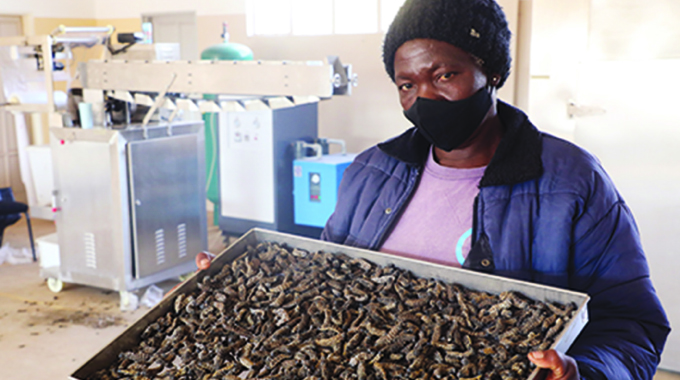Matshiloni amacimbi plant boost rural livelihoods

Thupeyo Muleya
Beitbridge Bureau
The Government has moved a gear up in operationalising the principles of devolution to push economic and sustainable development from community to national level to realise its envisaged Vision 2030.
The vision as enunciated by President Mnangagwa is to turn the country into an upper-middle-class economy by that year (2030).
Among other things, the effective tapping and use of natural resources, are some of the areas identified to stir community development and rural industrialisation.
This has become an inspiration for a group of 41 women from the Matshiloni area, 40km north of Beitbridge town, who have established a mashonzha/amacimbi/madora delicacy and multi-purpose processing plant.
An initial investment of US$500 000 was invested in 2017 by the African Development Bank, with the International Labour Organisation (ILO) and the Government being the implementing partners.
Women working under the Rovhona Raita Co-operative initiated the setting up of the amacimbi and multi-purpose processing plant.
According to the chairperson, Mrs Jessie Ndou, they started off with a small garden growing cash crops for resale before diversifying into livestock production in 2006.
They later applied for a stand from the Beitbridge Rural District Council (BBRDC) in 2014, where they carried out horticulture.
“Around 2017, as we engaged potential investors to build an amacimbi warehouse, we approached the Ministry of Women Affairs and Community Development, which linked us with ILO and this led us to secure funding from the African Development Bank,” said Mrs Ndou.
“With the funding, we managed to build this processing plant which has become our source of livelihood. Here we process, package and distribute amacimbi.
“Off-season, we process and package a number of items including beans and dried vegetables, but the number of products is not limited to these items only, we intend to introduce more in future”.
The Government helped the cooperative to register a company, Mvelelo Private Limited, in August 2019 so that they could manage to set up a business entity.
The corporative started with 41 women, but now it remains with 21 people, after others left along its journey to transformation, while others have passed on.
Mrs Ndou said they were targeting to distribute products locally and export to lucrative regional and international markets.
“Amacimbi are rich in various nutrients, according to food experts and these are areas where we have a comparative advantage and we want making use of it,” she said.
Renowned lawyer and company secretary, Mr Winston Tshakalisa said they were working on diversifying operations and procuring more equipment for the project.
He said the community can now benefit from the modern infrastructure and the use of technology to get more returns.
“We are located in a rural set up and this is good for rural industrialisation. There is a lot of value addition potential when we look at the many products to be processed compared to the traditional methods they were previously using,” said Mr Tshakalisa.
“The raw product is in abundance here, and we are hopeful that with the proper technical support and capital injection, more employment opportunities will be created for community members here.
“This is besides creating a ready market for amacimbi for many people around Matabeleland South province.”
ILO’s National Project Coordinator, Mr Jairos Chanetsa said they had managed to give technical support to the Government and the women to realise their potential.
He said they had put up a fence, a borehole, installed 15 000 litre water tanks and solar power as well as connecting the plant to the national grid.
“This company is providing a market for mostly women and other members of the community who harvest amacimbi in the forest. These are then processed into a final product which would be found on shelves in most shops,” said Mr Chanetsa.
“As such, this increases the value of amacimbi and also provides another additional stream of income to the women in the company and those supplying them with the raw product. It also eliminates the use of the middlemen in the supply chain.”
Work is in progress to ensure that the project reaches its full operational capacity and to create other business opportunities along the value chain.
African Development Bank’s Social Development officer, Mr John Ng’ambi said the project fell under the many initiatives covered by the US$4,1 million the bank had invested in community development in Zimbabwe.
“This initiative falls right into our high fives, including; Feed Africa, Industrialise Africa, Power Africa, Improve lives of African people and Governance. We need to promote this across the whole of Africa,” he said.
Beitbridge District Development officer (Women Affairs), Mr Vusumuzi Siduli, said the Government was providing management, entrepreneurship skill, training and bookkeeping to improve viability and household incomes. Another member of the cooperative, Ms Sarah Muleya said they were expecting each member to earn more than R3000 monthly from the business.
“We are grateful for this investment and we are encouraging more youthful members to join in, so that we will have continuity of this project,” said Mrs Emma Sibanda.
Mrs Hangwani Ndou said she was excited at the prospects of opening new revenue streams for her family and general welfare of her rural community. The establishment of processing plants in various parts of the country was in line with the thrust of the Government to promote value addition and beneficiation.
The plants will not only boost employment, but reduce post-harvest losses, transport costs, provide proper grading infrastructure and address the problem of depressed prices, especially among small-scale traders.







Comments